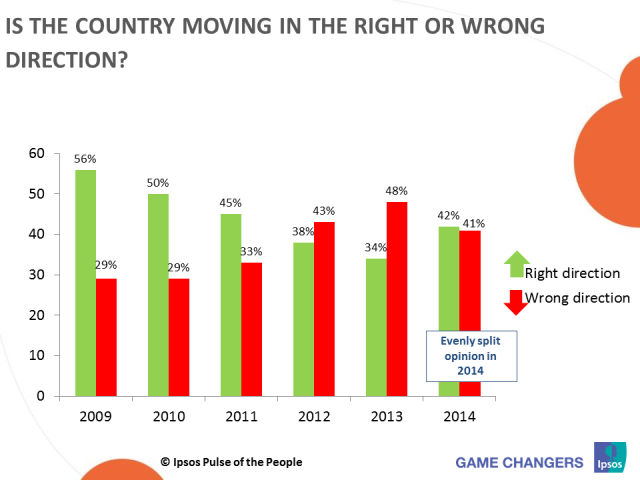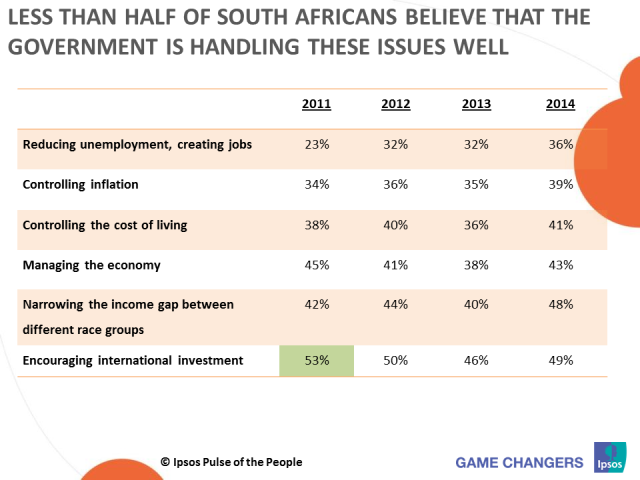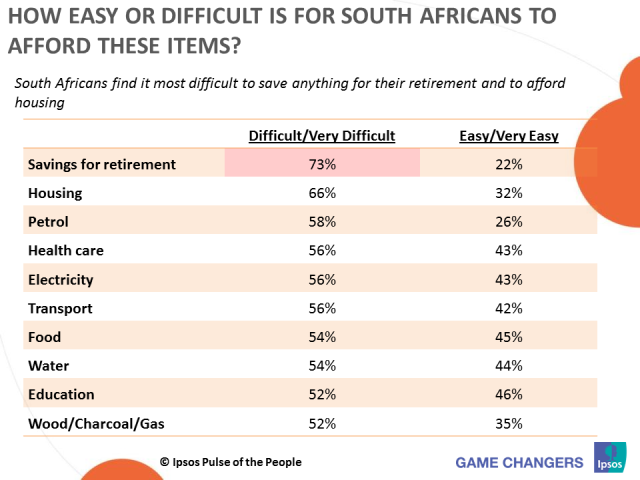Ipsos Poll: South Africans and the economy
South Africans display a higher degree of optimism following last year's elections
"Following the 2014 General Election, South African adults are marginally more optimistic about the direction in which the country is going. The performance of the government on the economic terrain is also viewed slightly more positively, however, no "pass marks" are achieved yet",[1] says Mari Harris, Director of Public Affairs at Ipsos in South Africa.
From 19 September 2014 to 24 October 2014 a total of 3,608 randomly chosen adult South Africans were interviewed in their homes and home languages as part of the Ipsos Pulse of the PeopleTM study (see Technical Detail at the end of press release for more information).
Split opinions: Is the country going in the right or in the wrong direction?
An important indicator of the general mood in the country is the question on whether the country is moving in the right or the wrong direction. Since 2009, the proportion of adult South Africans who believe that the country is moving in the right direction has declined significantly, while the proportion believing it is moving in the wrong direction has grown.
However, the findings of the November 2014 poll are more positive, with an increase of eight percentage points in the group who said that the country is going in the right direction. Currently, opinions are split with almost equal proportions saying the country is either going in the right or in the wrong direction.
The remainder, i.e. 17% indicated that they are uncertain. "It is a common international phenomenon in democracies that the mood in the country becomes more positive following an election, as people develop a renewed sense that things would change for the better," says Harris, "obviously, depending on what happens in the aftermath of an election, the mood can change fairly quickly, as was illustrated by the recent elections in Greece."

Performance of the government economically
The Ipsos Pulse of the PeopleTM study undertaken towards the end of 2014 also included the section on Government Performance Barometer (GPB). It measures public perceptions about the South African government's performance in handling key policy areas. These polls are undertaken every six months. Respondents were asked to indicate whether they thought the government was doing "Very Well", "Fairly Well", "Not Very Well" or "Not At All Well" in handling different policy areas including economic, social, governance and administration areas. On the day before the budget speech in Parliament we will concentrate on the performance of the government on the economic terrain.
The table below summarises the findings of the November surveys of the last four years and shows the proportion of adult South Africans who thought the issue was handled well ("very well" or "fairly well"):

Although the government's handling of all these issues are viewed more positively than in November 2013, in all these cases still less than half of South Africans believe that the government is handling these issues well.
Looking in more detail at issues around the cost of living, respondents were asked if they thought that the cost of living was rising faster than the official inflation rate. More than seven in every ten (72%) agreed! Some uncertainty was also expressed, with 17% indicating that they neither agreed nor disagreed, one in every ten (9%) disagreed and 2% said that they did not know.
This finding raises questions about the affordability of basic items and respondents were asked how easy or difficult it was for them and their families to afford items. The results are summarised below.[2] South Africans find it most difficult to save anything for their retirement and to afford housing. However, for each of the ten items more than half indicated that they find it difficult or very difficult to afford them - making it clear that South Africans in general are struggling to make ends meet.

Technical detail:
A total of 3,608 personal face-to-face interviews were conducted with randomly selected adult South Africans. The interviews were done in the homes and home languages of respondents. Trained quantitative fieldworkers from all population groups were responsible for the interviewing, which took place from 19 September to 24 October 2014. Interviews were done all over the country, from metropolitan areas to deep rural areas. This methodology ensured that the results are representative of the views of the universe and that findings can be weighted and projected to the universe - i.e. South Africans 15 years and older.
Interviews were done using CAPI (Computer Assisted Personal Interviewing) and all results were collated and analysed in an aggregate format to protect the identity and confidentiality of respondents.
All sample surveys are subject to a margin of error, determined by sample size, sampling methodology and response rate. The sample error for the sample as a whole at a 95% confidence level is a maximum of 1,67%.
About Ipsos: The Home of Researchers
Ipsos is an innovative, entrepreneurial, client-focused organisation, providing research services to clients on a global basis. We set ourselves high standards and aim to work collaboratively in partnership with our teams in order to service our clients most effectively.
Ipsos is proud to be the only global market research company that is still controlled and operated by researchers. We aim to remain the natural home for intellectually curious and passionate researchers.
Our goal is simple: to be our clients' preferred research partners in our areas of specialisation, methodologies and processes. We want our clients to be proud and pleased to work with us - and we want each one of us to be proud and pleased to offer our clients high quality standards, efficiency and intelligence.
Footnotes:
[1] The findings of the poll on government performance are usually presented in the form of a traffic light: red light areas, in which the government achieves an approval rating of less than 50% are those needing immediate and dedicated attention; orange light areas, in which the government achieves and approval rating of 50%-74% are those needing urgent attention and green light areas in which the government achieves an approval rating of 75% and above, needing maintenance.
[2] In each case the balance indicated that they did not have an opinion, or were uncertain about this issue.
Statement issued by Mari Harris, Director Ipsos Public Affairs, February 24 2015
Click here to sign up to receive our free daily headline email newsletter

